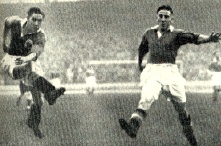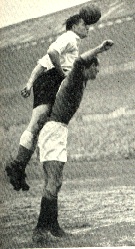
Stanley Mortensen
Born South Shields, May 26, 1921, died 1991
There can be no doubt that Stanley Mortensen owed a large debt of gratitude to the imperious wing play of Stanley Matthews during his illustrious career as a rapacious goal getter for both Blackpool and England, a debt the universally gracious Mortensen was always first to acknowledge. Yet never has a footballer lived so unjustly in the shadow of one of his colleagues.
This is not to take anything away from the magnificent Matthews, simply a comment on the disparity of regard in which history has come to remember these men. This anomaly is hard to explain but easy to illustrate.
In 1953 Stan Mortensen scored the only FA Cup final hat trick of the twentieth century yet the game instantly became known as the Matthews Final. When he died, just four days short of his 70th birthday in 1991, one wag observed that it would probably become known as the Matthews Funeral. This is what Morty was up against!
Along with the other Stanley, Mortensen has every right to be remembered alongside the very best of England’s footballers.
Born in South Shields with Norwegian ancestry he signed for Blackpool in 1938 but had to wait until 1946 to make his league debut, one of the many players whose careers suffered because of the war.
Indeed the war almost denied Mortensen his football career altogether. A wireless operator in the RAF, Mortensen was involved in a plane crash which left him badly injured.
In time a full recovery from these injuries would be made and Mortensen was able to make some impression in the limited wartime football arena. This impression included turning out for Wales in an unofficial international match against England when the men from the valleys turned up short.
It is often remarked by those who lived through the post war period that modern players do not seem to enjoy playing football as much as the men of that time. Perhaps the war itself is one of the main reasons for this. Men who have been to war probably will find more true enjoyment in something like a game of football.
Whatever the case Mortensen probably felt he had more to be thankful for than most in being a professional footballer, and there can be few players who ever displayed the pure joy they felt in playing the game as Morty.
Hunched over the ball at the kick off, eagerly rubbing his hands together and hurriedly shuffling from foot to foot in anticipation of the referee’s whistle, Mortensen remained the boy let out of school all his life.

He had every reason to enjoy playing the game as well, for he was extremely good at it. Mortensen was a prolific goalscorer who was not confined to the centre forward position, indeed he generally occupied one of the inside forward positions during his England career.
He was as sharp as a razor, snaffling up chances inside the six yard box with the best of them while remaining equally dangerous, and his most exciting, when attacking from deep.
Extremely strong and incredibly quick he could cut through a defence in the blinking of an eye. His shooting, likewise, was explosive. Indefatigable, he never considered a cause lost or a ball not worth chasing. He was a champion.
Mortensen announced himself on the footballing stage with twenty eight goals in the first season after the war and carried on scoring regularly throughout his time at Blackpool, leading the first division scoring charts in 1951 with thirty goals.
A wonderful team to watch, the Seasiders were never strong enough to challenge for a league title despite boasting several other talented individuals to complement the two Stan’s.
Having lost out in the FA Cup finals of 1948 and 51 it seemed as though Mortensen, along with Matthews, was destined to complete his career without a major honour.
The 1948 FA Cup was particularly galling for Blackpool and Mortensen in particular. Having scored in every round, including all three in the semi final as Blackpool defeated Spurs 3-1, Mortensen registered again in the final and also won the penalty with which his team held a 2-1 lead. In a rousing finale, however, Manchester United had swept to glory with three late goals.
The fact that the match remains one of the competitions’ classics was of scant consolation. When Blackpool reached another final in 1953 it was widely regarded as being the last chance of a winners medal for the two great men.
Trailing 3-1 to Bolton Wanderers with three quarters of the game gone it seemed certain that the fairy tale ending was not about to transpire. Famously, however, it did and although Matthews receives the plaudits to this day for his part in the comeback at least an equal share belongs to Mortensen.
He had already scored his teams’ first half goal before reducing the arrears in the second, reacting instantly when Stan Hanson in the Bolton goal spilled a Matthews’ centre. Then, in the last minute of normal time he brought the scores level with a breathtakingly brutal free kick from the edge of the area which arrowed over the corner of the wall and ripped into the top corner of the net in a blur.
With both the Bolton left back and left half virtual passengers with injuries, their team had been holding on desperately to their lead and this was in effect the killer goal. There was no way they could survive extra time, as it turned out they didn’t have to. Matthews still had time to slice open the Bolton left flank one last time and provide the opening for Bill Perry to bang home the winner, thereby giving both Mortensen and Matthews the medals they craved.
Interestingly Matthews gave full credit to Mortensen, even for his part in the winning goal, praising the run he had made into the six yard box which drew the covering defenders out of the middle and left Perry completely open. This was not the story anybody wanted to tell, however, and the Matthews Final was born.
As well as offering Blackpool sterling service in the post war period Mortensen was also one of England’s stalwarts during what was considered a golden era. Between 1947 and 1953 Morty made twenty five appearances for his country and scored twenty three goals, a remarkable feat.
He arrived on the international scene in remarkable circumstances, scoring four goals on his debut in a 10-0 victory over Portugal. Many believe the forward line assembled that day, Matthews, Mortensen, Lawton, Mannion and Finney, to be England’s best ever.
One year later the same combination would fire England to a 4-0 win in Italy, a performance generally viewed as superior even to the one given in Lisbon. On a baking day when the England Team had to withstand tremendous Italian pressure in the first half they were thankful for the goal given to them in the opening seconds by Mortensen. Sprinting clear from half way Morty, with no-one able to offer support, had smashed a truly ferocious shot into the roof of the net from what had appeared an impossible angle near the goalline. It was a typical Mortensen goal in many ways but astonishing also, even by his standards.
Mortensen also scored England’s first ever goal in a World Cup finals, notching the opener in a 2-0 defeat of Chile in Brazil in 1950, though this tournament would end an embarrassing disaster after subsequent defeats to the United States and Spain.
Following this tournament Mortensen became less of a regular member of the national team and was perhaps unlucky in earning a recall just in time to face the Hungarians at Wembley in 1953. England were humbled in this match, losing 6-3 to one of the finest exhibitions of football ever given and Mortensen, at thirty two, was one of the casualties, never playing for his country again.
Typically he could bow out with his head held high, however. Certainly England’s best performer on the night he had scored one of the goals and also earned the penalty from which Alf Ramsey ended the scoring with yet another of his lung busting bursts into the box.
Mortensen’s playing career faded out with spells at Hull and Southport although he remained involved in the game for a good spell afterwards, returning to Bloomfield Road as manager in the late 1960’s.
It is not just as a great player in the tangerine of Blackpool that Mortensen will be remembered, Tom Finney described him as “the finest match winner I have ever seen or played with”, but also as a great man.
Mortensen not only offered to give one of his cup medals to an opponent who had been injured in a challenge with him shortly before the 1952 final but later on auctioned off his medals to raise money for Blackpool when the club was in dire financial trouble.
More than just a player Mortensen was a true ambassador for the game he loved.
Stan Mortensen Career Stats
CLUB GAMES GOALS
Blackpool 317 197
Hull City 42 18
Southport 38 10
England 25 23
Total 422 248
